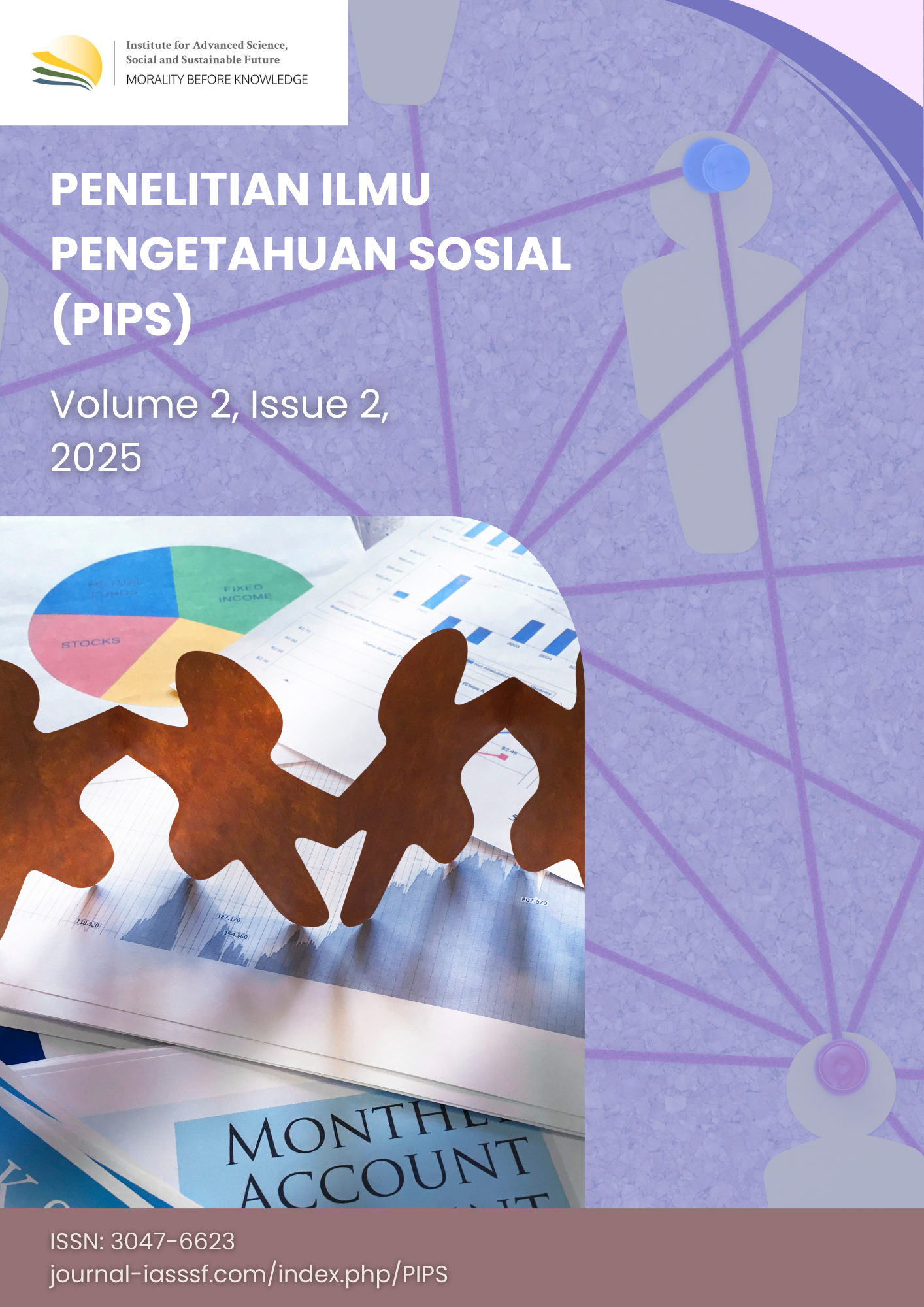Enhancing arabic speaking skills through the chain story technique at Islamic boarding school
DOI:
https://doi.org/10.61511/pips.v2i02.2025.2238Keywords:
mahārah al-kalam, chain story technique, Arabic speaking skills, Islamic boarding school, language learningAbstract
Background: Mahārah al-kalam (Arabic speaking skills) learning at DIS Islamic Boarding School is a program implemented to enhance students' proficiency in Arabic, particularly at the Language Center. Students at the boarding school come from diverse educational backgrounds, including elementary, middle, and high school levels, with some having no prior exposure to Arabic. This diversity often leads to difficulties in mastering the language. To address this, the boarding school employs the chain story technique, a method designed to facilitate effective and accurate Arabic speaking skills. This study aims to explore the implementation of Mahārah al-kalam learning using the chain story technique at DIS Islamic Boarding School. Methods: This research adopts a qualitative descriptive approach through field research (Field Research). Data were collected using observation, interviews, and documentation techniques. The research subjects included teachers and students at DIS Islamic Boarding School. Findings: The study reveals that the chain story technique significantly enhances students' Arabic speaking skills. Students are provided with vocabulary (mufrodat) exercises every Tuesday, Wednesday, Friday, Saturday, and Sunday. Mahārah al-kalam activities are conducted weekly on Saturdays, followed by evaluations on Sundays to assess students' progress. The technique not only improves speaking skills but also integrates listening, reading, and writing abilities, creating a comprehensive and engaging learning environment. Conclusion: The chain story technique proves to be an effective method for improving Mahārah al-kalam learning, fostering students' confidence and proficiency in Arabic. Its integration of multiple language skills and interactive approach makes it a valuable tool for language education in Islamic boarding schools. Novelty/Originality of this article: This study highlights the innovative application of the chain story technique in Arabic language learning, particularly in the context of Islamic boarding schools. It provides new insights into how interactive and creative methods can address the challenges of teaching Arabic to students with diverse educational backgrounds.
References
Aini, N., Hatip, M., & Kamilah, N. (2024). The influence of chain story technique in speaking skill. Proficiency, 6(2). https://doi.org/10.32503/proficiency.v6i2.5432
Alpinah, F. (2020). Usaha peningkatan maharah kalam bahasa Arab melalui metode muhadatsah bagi santri di Pondok Pesantren Al-Ikhlas Putri Kuningan. Universitas Islam Indonesia.
Beahm, L. A., Yan, X., & Cook, B. G. (2021). Where do teachers go for behavior management strategies? Education and Treatment of Children, 44(3), 201–213. https://doi.org/10.1007/s43494-021-00046-2
Fitri, A., Pudjiati, D., & Mawarni, V. (2023). Using chain story technique to improve students’ speaking skill. Proceeding of International Conference on Education-02 (pp. 117–122). https://doi.org/10.37640/ice.02.628
Hanifah, Y., Safii, R., & Hasan, A. A. (2023). Learning models of Mahārah al-Istimā’ and Mahārah al-Kalām at An-Najah Purwokerto student boarding school. Eloquence: Journal of Foreign Language, 3(1), 42–53. https://doi.org/10.58194/eloquence.v3i1.1497
Hermawan, A. (2018). Pembelajaran keterampilan berbahasa Arab. Alfabeta.
Hidayah, N. S. L., Hasyim, F. Z., & Azizah, A. (2023). Mastering language skills: Exploring key aspects in ELT (English language teaching). Digital Bisnis: Jurnal Publikasi Ilmu Manajemen dan E-Commerce, 2(3), 386–405. https://doi.org/10.30640/digital.v2i3.1589
Hossain, K. I. (2024). Reviewing the role of culture in English language learning: Challenges and opportunities for educators. Social Sciences & Humanities Open, 9, 100781. https://doi.org/10.1016/j.ssaho.2023.100781
Idrus. (2019). Evaluasi dalam proses pembelajaran. Jurnal Manajemen Pendidikan Islam, 9(2), 922. https://doi.org/10.35673/ajmpi.v9i2.427
Immanuel, Y., Luik, J. E., & Tjahyana, L. J. (2025). Communication accommodation strategy among members of the OMORI online community: A case study on the use of semantic shifted slang by Generation Z. Scriptura, 15(1), 95–106. https://doi.org/10.9744/scriptura.15.1.95-106
Jabat, Y. J., & Taufiq, M. (2024). Problems of learning Mahārah Kalām in Arabic language learning for students of MTs EX-PGA Univa Medan. Ihya al-Arabiyah: Jurnal Pendidikan Bahasa dan Sastra Arab, 10(2). https://doi.org/10.30821/ihya.v10i2.25865
Lawotan, Y. E. (2018). Penerapan teknik cerita berantai untuk meningkatkan keterampilan berbicara pada siswa kelas IV SD Inpres Nangameting. Jurnal At-Tadbir STAIN Darul Kamal NW Kembang Kerang, 2(2), 42. https://totobuang.kemdikbud.go.id/jurnal/index.php/totobuang/article/view/209
Mengist, W., Soromessa, T., & Legese, G. (2020). Method for conducting systematic literature review and meta-analysis for environmental science research. MethodsX, 7, 100777. https://doi.org/10.1016/j.mex.2019.100777
Mukhtazar. (2020). Prosedur penelitian pendidikan. Absolute Media.
Mutmainah. (2014). Strategi pembelajaran maharah kalam di lembaga pendidikan bahasa Arab Ocean Pare Kediri. Jurnal Pendidikan Bahasa Arab, 5(1), 2. https://jurnal.yudharta.ac.id/v2/index.php/studi-arab/article/view/42/29
Musyafaah, N., Indriana, N., Widayanti, R., & Nuha, M. A. U. (2023). Improvement of Mahārat al-Kalām in Arabic Learning through Total Physical Response Method. Al-Ma’rifah, 20(1), 77–90. https://doi.org/10.21009/almakrifah.20.01.06
Nurhalimah. (2020). Implementation of chain story technique to improve students’ speaking skills in the third grade of SDN 136 Pekanbaru. Jurnal Pendidikan Guru Sekolah Dasar, 9(3), 337. https://primary.ejournal.unri.ac.id/index.php/JPFKIP
Nurwahyuni, K., et al. (2021). Upaya meningkatkan keterampilan berbicara melalui teknik cerita berantai. Seminar Nasional Pendidikan 2021, STKIP Kusuma Negara III.
Ramadani, R., Yuliana, Y. G. S., & Suhartono, L. (2022). Improving students’ speaking skill through chain story technique. Jurnal Pendidikan dan Pembelajaran Khatulistiwa (JPPK), 11(8). https://doi.org/10.26418/jppk.v11i8.57529
Ritonga, M., Nurdianto, T., & Rahmawati, R. (2022). Strategies for improving Arabic language ability through language environment: Phenomenology studies in Islamic boarding schools. Journal of Language and Linguistic Studies, 18(1), 496–510. https://doi.org/10.52462/jlls.19
Sapitri, D., Khatimah, I., Risnawati, R., & Febiola, W. G. (2025). The relevance of Arabic in Islamic studies: Linguistic implications for understanding the Qur’an and Hadith. Shawtul Arab, 4(2). https://doi.org/10.51192/sa.v4i2.1654
Sari, N. R. (2017). Peningkatan keterampilan berbicara melalui teknik cerita berantai siswa kelas IV. Jurnal Pendidikan Guru Sekolah Dasar, 6(2), 159. https://journal.student.uny.ac.id/ojs/pgsd/article/view/6617
Sugiyono. (2013). Metodologi penelitian kuantitatif, kualitatif, dan R&D. Alfabeta.
Sukarno, & Jinabe, M. (2024). The needs of English for elementary school students: From family to school. Jurnal Prima Edukasia, 12(1), 83–98. https://doi.org/10.21831/jpe.v12i1.67841
Tegor, et al. (2020). Metodologi penelitian kualitatif dan kuantitatif. Lakeisha.
Yasin, A., Idris, F., & Setia Dien Labolo, S. N. (2024). Pengembangan Pengajaran Mahārah al-Kalām untuk Meningkatkan Kemampuan Bahasa Produktif Tingkat Tinggi: Taṭwīr Ta’līm Mahārah al-Kalām litaḥsīn al-Mahārāt al-Lugawiyyah al-Intājiyyah al-‘Āliyah. Aphorisme: Journal of Arabic Language, Literature, and Education, 4(2), 241–255. https://doi.org/10.37680/aphorisme.v4i2.4538
Downloads
Published
How to Cite
Issue
Section
Citation Check
License
Copyright (c) 2025 Mila Nurkhamilah

This work is licensed under a Creative Commons Attribution 4.0 International License.














